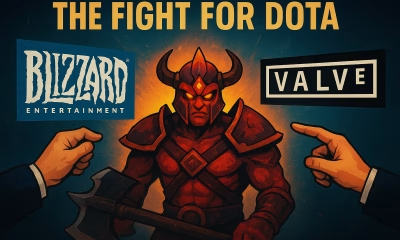Labor&Immigration
Saudi Arabia Esports and Ethics: The Dilemma of the LGBTQ+ Community Competing in KSA
The intersection of esports, international law, and human rights has once again come into the spotlight with the announcement of the 2024 World Esports Championship (WEC) in Riyadh, Saudi Arabia. This event, poised to be a major gathering for gamers from across the globe, has raised serious concerns regarding the safety and inclusion of LGBTQ+ players, with Esport Canada at the center of a growing debate.

Table of Contents
Navigating Player Safety and Inclusion in Saudi Arabia
On 11 March 2024, Esport Canada opened applications for the Canadian women’s Counter-Strike 2 team, set to compete in Riyadh. Interest from players like Ariane “ARIANARCHIST” Lafrenière, a current ESL Impact Season 5 competitor and openly transgender player, quickly turned to concern over safety in a country known for its stringent laws against the LGBTQ+ community. According to Human Rights Watch, Saudi Arabia’s treatment of LGBTQ+ individuals includes severe punishments such as flogging, imprisonment, and even the death penalty for homosexual acts.
In light of these concerns, Melissa Burns, Founder and CEO of Esport Canada, made a sobering acknowledgment:
“Esport Canada cannot make any promises/guarantees about the safety of LGBTQ+ competitors at the Saudi event.”
This admission reflects a troubling conflict between the organization’s commitment to “Equity, Diversity & Inclusion” and the reality of participating in an event hosted in a country with a well-documented history of human rights abuses.
The Global Esports Dilemma
This issue is not unique to Esport Canada. The Norwegian Esports Federation, through its President Elin Yoojung Moen, expressed similar sentiments, acknowledging the impossibility of assuring safety for LGBTQ+ members of their delegation. Moen’s statement to Erik Fossum of pressfire.no,
“we cannot guarantee that a Norwegian gay or transgender person [won’t be] arrested for being themselves while in Saudi Arabia,”
highlights the ethical responsibilities of esports organizations and the broader gaming community when choosing event locations and partners.
The dilemma faced by Esport Canada and others is emblematic of a larger issue within international sports and esports: the balancing act between global inclusivity and the sovereignty of host nations with conflicting values. Saudi Arabia’s investments in sports and esports, part of its Vision 2030 initiative, have sparked debates about “sportswashing” – the practice of using sports investments to distract from human rights issues.
The Facade of Openness
The Saudi Tourism Authority’s recent statement that it is “welcoming LGBT tourists” underscores a profound contradiction within the kingdom’s policies towards the LGBTQ+ community. By stating,
“Everyone is welcome to visit Saudi Arabia and visitors are not asked to disclose such personal details,”
the authority suggests a superficial openness that belies the harsh reality faced by the local LGBT community. This form of “don’t ask, don’t tell” policy, aimed at boosting tourism, starkly contrasts with the life-threatening conditions under which the local LGBTQ+ individuals live.
Modernization Versus Human Rights
The kingdom’s efforts at modernization under Crown Prince Mohammed bin Salman, including the introduction of cinemas and music concerts, have not extended to meaningful reforms in human rights practices. The continued enforcement of sharia laws and the doubling of capital punishments under his leadership reveal a disconcerting gap between the image Saudi Arabia wishes to project and the oppressive conditions that prevail within its borders. For the local LGBTQ+ community, the kingdom’s invitation to LGBT tourists is a grotesque insult, highlighting the disparity between the treatment of foreign visitors and the reality of those living under its laws.
Implications for Esports and Beyond
The juxtaposition of Saudi Arabia’s attempts at rebranding with its unchanged human rights record poses significant ethical questions for international bodies and organizations like Esport Canada. Participating in events hosted by countries with such glaring discrepancies in their treatment of human rights exposes the complex interplay between economic opportunities and ethical considerations. As the esports industry continues to grow, the decisions made today will undoubtedly influence its moral and ethical landscape in the years to come.
The scenario surrounding WEC 2024 in Riyadh illustrates the urgent need for a broader dialogue within the esports community and beyond—about respecting and ensuring the safety of all participants, regardless of their identity. It challenges stakeholders across the spectrum to reconcile the allure of global engagement with the imperative of upholding the dignity and rights of every individual.
Image source: New Thinking
Article with information from: dust2.us

















